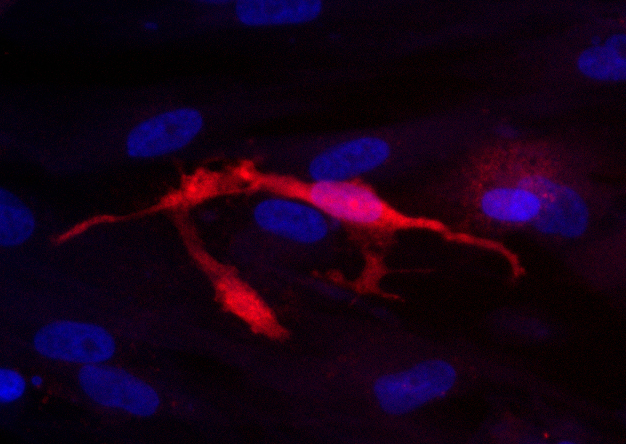
About 15 percent of the cells in our brains are scavengers—roving immune cells known as microglia that remove infectious agents, damaged neurons and plaques. USC Stem Cell scientist Justin Ichida is taking a close look at the role of microglia in the onset of Alzheimer’s disease, with support from a $100,000 gift from the John Douglas French Alzheimer’s Foundation.
Because it would be damaging to extract microglia directly from the skulls of Alzheimer’s patients, Ichida’s group is taking a far less invasive approach. Using small samples of patients’ blood or skin, they’re applying a technique called “reprogramming” to transform these cells into microglia.
“We’ve used this approach to produce functional nerve cells and other cell types, but not microglia, so this will be a first,” said Ichida, who also uses reprogramming to study ALS and frontotemporal dementia.
Ichida’s team will then use a gene-editing tool called CRISPR to introduce two genes associated with Alzheimer’s disease into the patient-derived microglia. They will observe how these two genes—called Phosphatidylinositol-binding clathrin assembly (PICALM) and Triggering receptor expressed on myeloid cells 2 (TREM2)—alter the function of the microglia. These genetic changes could cause a variety of problems, such as triggering inflammation, or preventing microglia from cleaning up defective proteins known as amyloid plaques, which are implicated in Alzheimer’s disease.
In addition to revealing how these two Alzheimer’s-related genes affect the function of microglia, this project will pave the way for other researchers to study microglia on a patient-specific basis.
“Dr. Ichida is a trailblazer, and our foundation has a longstanding commitment to supporting pioneering approaches to both preventing and finding a cure for Alzheimer’s disease,” said Dan Michel, president of the John Douglas French Alzheimer’s Foundation.
Cheryl M. Craft, an international scientific advisor and member of the Board of Directors at the foundation and a professor of Ophthalmology and Integrative Anatomical Sciences at the Keck School of Medicine of USC, added: “By supporting the most creative, cutting-edge researchers, the foundation is accelerating the quest for new treatments for the increasing number of patients suffering from Alzheimer’s dementia.”
As a longtime champion of such innovative research, the John Douglas French Alzheimer’s Foundation has given more than $2.5 million to USC. Their gift to the Ichida Lab honors Michael Minchin, Jr., who passed away while serving as the foundation’s president and CEO.
“I’d like to thank the John Douglas French Alzheimer’s Foundation for their support of my lab’s novel approach to studying Alzheimer’s disease,” said Ichida, assistant professor of stem cell biology and regenerative medicine. “Their partnership enables us to make new strides towards helping the 5.5 million Americans living with this debilitating and often fatal disease.”
